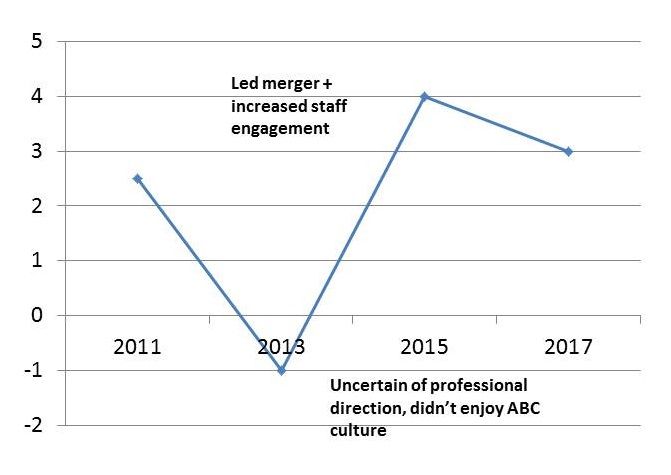A few of my recent coaching clients have found themselves in a mid-career crisis. I don’t use this phrase lightly. If you’ve invested heavily in a profession it’s scary to wake up one day and realise that you don’t want to continue doing that type of job for another 15 years.
Individuals have often moved roles in the same organisation or sector but find themselves at a loss when it comes to considering broader career opportunities. Clients describe feeling trapped, anxious because of their financial commitments and that their confidence is slipping away. This is hardly surprising when we spend much of our time and energy on our work.
There’s lots you can do to start to identify and explore options you may not naturally think about.
This isn’t about the mechanics of looking for another role but how you can gain insights into your strengths, what you don’t want to do and in what environments you’re likely to thrive.
These activities can be supplemented by working with a coach, but why not kick-start the process and get your creative juices flowing?
Here are some of the activities I use with clients wanting to make a career shift.
LOOK BACK TO LOOK FORWARD

Plot your career on a simple graph and mark on it your career highs and lows. Reflect on your timeline.
- What made the career highs?
- Was it the type of work or who you were working with?
- What were your main achievements and what skills and attributes did you use to deliver them?
- What different types of experiences have you had?
A really good question to ask yourself is whether you’ve had your absolute career high yet. If not, what might that look like?
If you’ve already had your absolute career high don’t despair! Think about all the factors that made it a high. This might include team, organisation, type of work, the amount of learning and stretch for you. Consider how you can recreate some of these conditions and which of them are most important to you. This might include reviewing what you do in other areas of your life including hobbies and creative projects.
Consider your career lows too as these will provide you with valuable information about what you don’t want and what you’ve learnt.
PHONE A FRIEND
Ask people you know what they most value about you and what they think you’re good at. If possible choose a mix of work and social contacts and ask them to give you some feedback. This exercise often surfaces many strengths and attributes that won’t be front of mind for you.
If you can, talk through why people think you have a particular strength or attribute.
Specific examples often help you to connect with the strengths people are talking about so that you recognise them as ‘yours’.
When you’ve collated the feedback take a look at what people have said and think about what resonates with you and why.
VALUES, VALUES, VALUES
There are lots of great exercises I use to help people understand themselves and what drives them more. If you’re thinking of a change in career getting clear on your values is essential.
One exercise uses the people who inspire you. Think about 2-3 people who really inspire you. Write down what you find inspirational about them and why. Anyone goes from your Gran to the Pope so take your time to think about this one.
If you can, find someone you can tell about your inspirational people.
Saying things out load often helps people to identify themes and have new insights.
Alternatively write your thoughts down.
We are inspired by things that are important to us. This exercise usually surfaces the things we want more of in our lives, or that we want to continue to have central in our career.
SPEAK TO A RECRUITMENT AGENCY
By now you should have generated lots of new ideas about your skills, what you enjoy and possibly organisations you’d like to work with. I’d recommend speaking to an agency in the sectors you’re interested in to find out what roles they have currently.
It’s always beneficial to talk through your experience with someone who doesn’t know you and can speak honestly about what roles they’d put you forward for and why. They may just suggest something you’ve never considered and you’ll get tips on which qualifications could help too.
Bringing all this thinking together should help you to start to articulate what you want to do next and will go a long way to crafting your new CV and social media profile.
This needs to say something about you so that potential employers can get an idea of what it would be like to work with you.
I’ve only scratched the surface in this short article, but I hope I’ve inspired you to get started on taking action if you’re unhappy with your career. Please do get in contact and share your experiences, questions and challenges.
